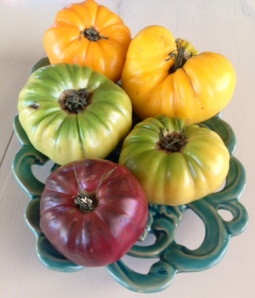The vegetable group to which I am referring is the nightshade family. What on earth are nightshades, you ask? They are part of a botanical family of plants that are more technically referred to as Solanaceae. Huh? Yeah, I can’t pronounce that word correctly either. Basically, what you need to know is that these plants all have certain characteristics in common. A couple of which include that they grow in shady areas and flower during the nighttime.
Commonly consumed plants that fall into the nightshade category include:
• Bell Peppers (Any & all colors & sizes.)
• Eggplant
• Goji Berries
• Hot Peppers (Including chilis, jalapenos, habaneros, chili-based spices, red pepper & cayenne.)
• Paprika
• Potatoes (NOT including yams or sweet potatoes, but all other varieties.)
• Tomatoes
• Tobacco
Lesser-known nightshades:
• Gooseberry & garden huckleberry
• Cocona
• Kutjera
• Naranjillas
• Pimentos
• Tamarillos
• Tomatillos
This may seem like a fairly small list, but these foods are found in many places!
But should you care what a nightshade is? Maybe yes, maybe no.
According to http://www.paleoleap.com, “The best evidence for the health risks of nightshades is connected with autoimmunity.” Experiencing symptoms such as joint pain, arthritis, or diagnosis of any auto-immune-related disease should certainly leave you suspect of whether or not nightshades may be a problem for you specifically.
The same is true for people who frequently suffer digestive duress, or may have damage to their intestinal walls. Nightshades are known to contain alkaloids that help defend the plants from pests and molds that could kill them. Healthy guts are able to handle these alkaloids just fine, but people who have an already-compromised digestive system have trouble processing them.
It is important, as well, to note that some individuals are only slightly sensitive to nightshades. For those folks, it may be effective to simply reduce the amount of nightshades in their diets, or to be careful when preparing them. As an example, under-ripe nightshades tend to have a higher alkaloid content than veggies that are fully-ripened. Also, cooking and/or peeling the nightshades reduces their alkaloid content even further.
The most common reaction I get from my clients when bringing up the topic of nightshades is a quizzical sort of expression. An expression that seems to say, “So wait, now we’re restricting vegetables??”
I understand. If we are down to debating this vegetable over that one, we are in the nitty gritty of the diet-refining process. I will say this: I cannot emphasize enough that the ill-effects of nightshades are only relevant to those individuals who are sensitive to them. If that isn’t you, there is no reason to eliminate these healthy foods from your diet.
But if you suffer from ANY autoimmune disease, or are trying to heal your intestines from an inflammatory or leaky gut situation, you may want to consider a two-week elimination diet. This is where you cut all nightshades from your diet for a period of 14 days. If, after two weeks completely and totally off of these foods, you re-introduce them and feel worse, you would then know your body may not handle them well. If you notice no difference in symptoms on vs. off of these foods, you have the go-ahead to consume them as you please. (Keep in mind that food reactions can take up to 72 hours to fully manifest.)
Arguably the hardest part of eliminating nightshades from your diet is the restrictions of different spices and/or the elimination of tomato sauces. For individuals following a Paleo-type diet already, don’t despair! There are many resources available to you to help eliminate nightshades. “The Autoimmune Paleo Cookbook” by Mickey Trescott and “The Paleo Approach Cookbook” by Sarah Ballantyne are two that I would recommend. Both are available on http://www.amazon.com.
If you feel well already, and are eating a variety of fruits and veggies, keep up the good work! However, if you feel like you’ve tried other dietary improvements and find you still suffer from autoimmune-type symptoms, this may be the answer for you.
Yours in Health,
Angie
